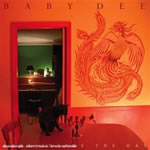|
|
 |
Dusted Reviews
Artist: Baby Dee Album: Safe Inside the Day Label: Drag City Review date: Jan. 22, 2008 |

|
|
|
 |
It's difficult to nail down the right context for Baby Dee's work. This might be because those on offer are expedient at best, esoteric and mystifying at worst. The classically trained harpist has toured and collaborated with Current 93 and Antony and the Johnsons, and spent a decade as musical director and organist at a Catholic church in the Bronx before emerging from sex-reassignment surgery to travel the streets of lower Manhattan on a giant tricycle in a bee costume, harp in tow. These fascinating, extramusical details make for interesting copy (and crop up in every alt-weekly profile of her I've read), but they maintain a comfortable distance from the question of what Baby Dee's music actually sounds like. Few listeners would believe Baby Dee's music is not of our time, yet her joyfully anachronistic music makes no concession to the current reign of niche-marketed music.
Safe Inside The Day – Baby Dee's third full-length, and her first for Drag City after a stint with David Tibet's Durtro imprint – is equal parts ambition and anarchy. A song is as likely to lapse into near-silence as it is to burst into hysterical laughter (the ballad "A Compass of The Light" does both), but Baby Dee never falls into self-parody or pathos. Which makes the indie rockers that populate the album's credits seem less like collaborators than devotees. Featuring production from Bonnie “Prince” Billy and Matt Sweeney, and session work from them as well as Andrew W.K. and James Lo, these feted musicians' contributions to the album feel so respectful as to occasionally be tentative, a quality that does nothing to hinder Baby Dee's vision of the album.
Listening to Safe Inside The Day, it's indeed difficult to imagine how anything substantial could be added to the songs. Still, one of the album's most thrilling moments is a collaborative one: on “Safe Inside The Day,” the album's first track, Baby Dee's voice descends from a full-throated ballad to a woody drone, creating a tone indistinguishable from the purr of the accompanying cello. The song seems to collapse into that second of languorous, ambivalent beauty, a moment that feels like a passing concession to the consolation found in even the most ugly memories and places.
Baby Dee has said that Oldham gave her the impetus to draw on her childhood in Cleveland when writing the songs that make up Safe Inside The Day. While they leave little doubt that Baby Dee's childhood had its fair share of darkness, the album's demeanor echoes the eerie comfort held in its title. The discontinuity between the mood-lit interior on the album's cover and the exterior shot of the house at twilight on its reverse is as explicit the work gets about its Proustian conceit: memories, like cathedrals or cars, feel impossibly bigger from the inside than they seem from without. (As Dee sings on the title track, "A gift that's bigger / Than the box it came in.") Accordingly, the music itself is a take on tin pan alley and maudlin Irish folk that's as substantial and affecting as Indie genre acts are arch and recondite. A generous sense of humor inflects everything on the album: perhaps only "Big Titty Bee Girl (From Dino Town)," crosses the line into simple bad taste, but remains interesting for offering a glimpse into what Baby Dee's busking act must have sounded like. (The song's chorus goes "You just can't keep a good albino down," and Dee informs the listener in one of the verses, “You can take him out and lynch him pinch a log on him / Tie a sausage to his dick and sic / Your dog on him.”)
Baby Dee's voice, her greatest asset and liability for the uninitiated, speeds from bluster to toneless rasp and alights on every conceivable affectation in between, though she never betrays her subject matter. In terms of sheer energy, "The Only Bones That Show" is the album's high point, but it's the shuffling track "The Earlie King" that best embodies the album as a whole. Musically, vocally and lyrically, Dee doesn't exactly have a tone: her music is propelled by a fruitful tension between the many different registers she brings to bear on a particular piece. “The Earlie King” is exemplary in this respect, opening with a boozy, booming voice that melts into cloying sentimentality: “What's that song I like to hear?” she fairly whines. Baby Dee is both the song's “dreamy child” and “father proud and strong”: utterly convinced of the titular character's (a hobo?) nightmarish appetite for children's souls, and forcefully obligated to dispel the vague presence. The strength of this album lies in how carefully it treads the ruptures between these two “doubled” figures and, by extension, the ruptures in Dee's own life. As an alternate title, I'm Not A Boy, Not Yet a Woman just may be appropriate.
By Brandon Bussolini
|







